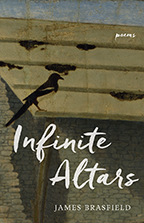» Book Review
Invitations to Linger
Infinite Altars: Poems by James Brasfield
LSU Press, 2016
92 pages, paper, $17.95

In an age submerged by torrents of evanescent information, the poems in James Brasfield’s second book, Infinite Altars, extend invitations to linger that prove a pleasure to accept. The collection has at its heart an instinctive patience, asking of its readers a corresponding willingness not just to witness or overhear, but to engage in the construction and accumulation of meditative insight. That responsive participation constitutes the most valuable (and these days, somewhat unusual) pleasure of lyric poetry, which Brasfield’s book offers generously throughout.
From our
seeing more closely, always more closely in our extreme attention, light’s angles and subtle shade, a recognition comes, this for the first time always— such presence, hidden from plain sight, emerges, as though it trusted our seeing—...
These lines from “Homage to Piero Della Francesca” in the book’s vividly pictorial opening section could be understood as a motto for the entire collection’s acts of attention, which consistently draw what Hopkins called inscapes out of their hiding places in ordinary experience. The volume’s opening poem, “Northern Bay,” gently turns its detailed landscape vision indoors and inward: “Diamond glints coming in, wind-driven, / a rhythm like rows of woodgrain / through a plank table…,” deftly evoking the life lived in “a room / arrayed with what’s been salvaged from a tide: / what a hand reached for, what remains.” The lyric strategies Brasfield explores are various: painterly meditations on the act of perception (“Window Frame”), delightful symbolist impersonations, as of a snail in “The Night of Daydream,” the gently mythic and allusive “Map,” and a lovely homage (“The Magic Gardener”) to Stanley Kunitz, one of Brasfield’s teachers and a presiding, one might say permission-giving spirit for the collection as a whole. The sensibility informing these poems thus establishes itself as trustworthily ambitious, refusing merely performative gestures, while premising a range of subject and approach that’s amply fulfilled by the book’s succeeding two sections.
If the book’s opening portion invites us to experience the evolution of perception toward illumination in language gently, slyly, honestly aware of its own interposition between what it presents and who perceives it, the middle section features pieces more various in their subjects and development. Daringly long, cinematic sentences still find their inherently apt pacing enhanced by Brasfield’s excellent instinct for line, but the range of tone broadens, and several of the poems pay discreet homage to canonical American voices. A gentle resonance of Hart Crane informs “Brooklyn to Menatay,” in which a train ride fosters access to the original inhabitation of this continent. “The Incorporation” recalls surviving factory work with a wonderment reminiscent of Philip Levine, and “Standard Time” meditates on the provisioning of firewood in manner that brings to mind Robert Frost and perhaps Richard Hugo. Brasfield closes this section of the book with an affectionate, evocative elegy for his long-widowed mother, “Afternoons Into Evenings.”
The elegiac tones established in that section’s closing poem gently suffuse this beautifully crafted book’s final third. Haunting poems such as “Demopolis” (a portrait of Brasfield’s grandmother), “Stray Stone,” and “Daylight Ghosts” have the courage of their mystery, of their moods and intimations. The social, the familial, the solitary aspects of experience all find expression here. Often in this culminating portion of the book, place and memory find each other out, penetrating experience to discover imaginative obligations, as in these lines from the poem “Soundings”:
Despite a shell held to my ear, there is no sound to memory— only remembrance, how-it-was-heard, as in the museum I saw de Kooning’s Screams of Children Come from Seagulls. Seeing it, I heard them again.
If a book of poems is indeed, as Wallace Stevens once opined, “a damned serious affair,” obligated to sing essences back into experience, it’s heartening to read Brasfield’s, so firmly rooted in its variety of impulse and settings, from Kiev to Brooklyn to Savannah, and so convinced of the value of patient, reverent attention, and its potentially exalting pleasures:
...a lark singing and you barefoot, standing in the celestial solitude of your identities—all around you silence has sung light into song.